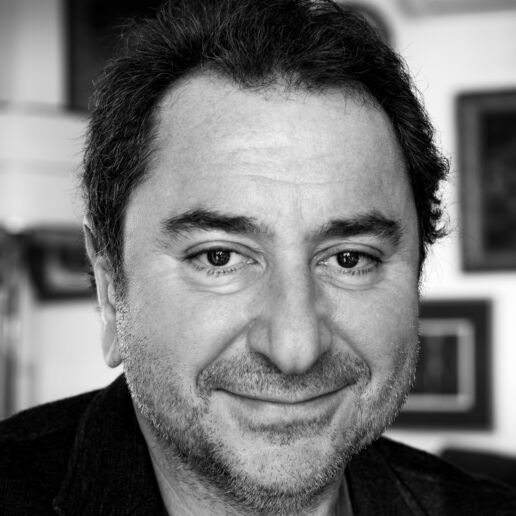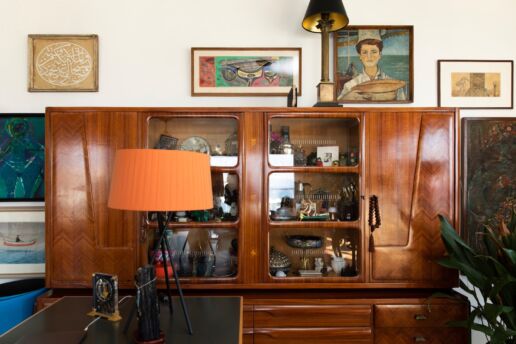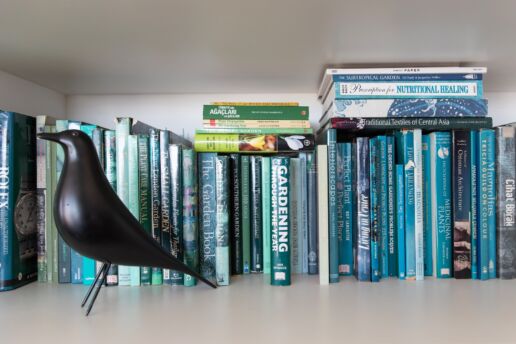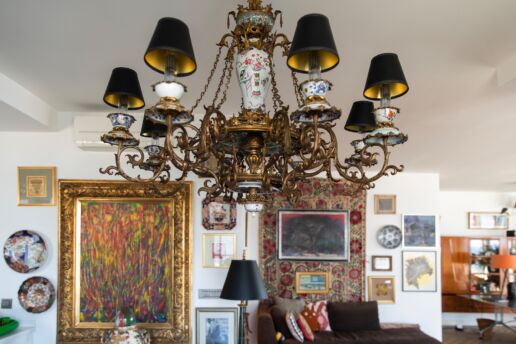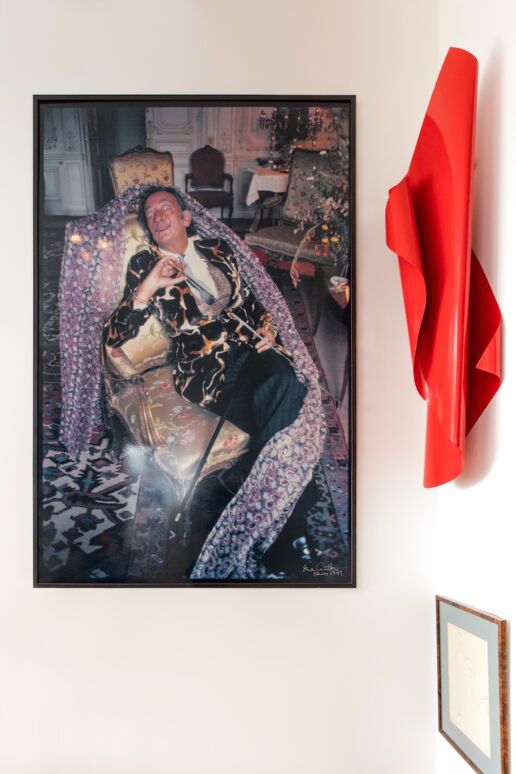MURAT PILEVNELI – THE GARDENER
I am in Fenerbahçe, a neighbourhood in Istanbul named after the city’s first lighthouse, an area that was formerly a popular summer resort and is now Murat Pilevneli’s year-round home. Pilevneli’s house is a reflection of his uniquely vibrant personality. It is there that I will have a wonderful conversation with him, ranging from the landscape designer’s profession to his style, his passion for collectibles to the family heirloom, Petek Pension.Photos: Nazlı Erdemirel
When Murat Pilevneli opens the door, I am pierced by the gaze of Salvador Dali. After I manage to disengage from Ara Güler’s classic portrait of the artist, I discover a room filled with a giant lump of quartz, antique furniture, a huge French chandelier with bronze inlay and a porcelain body, along with work by many artists like Yüksel Arslan, Eren Eyüboğlu and Gürbüz Doğan Ekşioğlu ranging the walls. These are clearly the signs of Pilevneli’s maximalist style..
We begin by discussing his journey through life and how he turned his passion for plants into a profession. Pilevneli got a degree in traditional Turkish handcrafts. He started working in his family’s textile business but quickly discovered that he was not fond of knitwear. When his asthma was aggravated by particles in the yarn, he began to take an interest in indoor plants that could help alleviate his suffering. As an avid autodidact, Pilevneli also wanted to learn how to improve the quality of the air he was breathing, in general, in the industrial Merter neighbourhood. He started bringing potted plants to his office and then planting and landscaping around the workshop. In the meantime, his close friend Nora Romi’s recommendation resulted in Pilevneli writing plant and garden design articles for the daily newspaper Milliyet. He once wrote an article about pine trees.“Which tree are you planning to decorate for the new year? It’s not good if your answer is the traditional pine tree. Please do not buy pines sold on the streets,” he wrote, now an advocate for plant life . “It is very likely that they have been rooted or cut illegally. A dormant plant will form new shoots when it finds warmth and water, fooled into thinking that spring has come.”
More is more
Pilevneli has a passion for writing, gardening, textiles and the craft of weaving, and an obsession that he has inheritedfrom his father Mustafa for antiques. He has a growing vintage watch collection and has had an interest in jewellerysince childhood. He likes to see different materials combined and loves yellow metals especially. His fondness fordiversity can be seen in the colourful, ornate rugs and artwork that he puts together, and in the collages he makes while decorating the walls. The variety of picture frames, with their worn surfaces, which, taken together, seem to be an expression of his character. Imperfections appeal to him more than shiny, new objects. He likes to turn a seasoned stool salvaged from his grandfather’s textile factory into a side table. He also loves the versatility of his time-worn 1950s velvet sofa, which has by now absorbed many stories in its cushions and upholstery .
“I mimic nature.”
Although Pilevneli sees himself as a gardener, he has designed the landscape of many large-scale hotels such as Maxx Royal Kemer and Bella Sombra Türkbükü. He has a clear concept of the relationship between plants and space: “Plants should not clutter. They should comfort the user, lighten a space and introduce beauty to it.” Whether indoors or out, Pilevneli always considers the expectations of architects when designing a landscape: “Ideally, someone looking at the end result should not notice what I recently did there. When I work with architects, I make sure that my work does not overshadow their design. I see the area I landscape as a whole with its floor cover, stones, and wall. My ideal is to bring the nature that lives outside, indoors, as if it has already lived there for many years.”
İstanbul
According to Pilevneli, Istanbul is a diamond. “I like the Grand Bazaar the most. I could wander around there all day. I can put my bag on my back in the morning and go in and out of Istanbul’s antique shops till dusk. I also get the chance to meet a lot of extraordinary people there.” Beyti, Sanayi 313, Lokanta Kru, Çiya, Delicatessen, Petra Roasting Co. and Zula are among Pilevneli’s favourite haunts in the city.
The landscape designer has strong ties to Sanayi313 and says he finds designer and owner Enis Karavil inspiring. Currently, they are collaborating on the design of a summer house in Bodrum. Pilevneli thinks that open spaces are crucial in summer houses. He has previously landscaped Maslak Sanayi313, where he tried to bring some colour to the space. “After the plants arrived, the furniture became more visible amidst the contrasting colours. They brought an appealing, green energy to Sanayi313.”
Figures with many stories
Pilevneli describes his father, a painter, as a person full of life. His house is full of his father’s work and the work of his friends. He talks about his father’s close friendship with photographer Ara Güler, architect Abdurrahman Hancı, painter Bedri Rahmi Eyüboğlu, painter Orhan Peker, writer Ferit Edgü, painter Cihat Burak, artist Ergin İnan, painter İsmail Türemen, ceramic artist Atilla Galatalı and many other acclaimed artists and their frequent weekend gatherings. Among the familiar faces who used to turn up were artists such as Orhan Peker and Cihat Burak. “These are people,” he says, “who always had a story to tell.” It must be a trait he carries in his genes. Pilevneli seems to collect people just like works of art. Trusting, lasting and deep-rooted friendships are of great importance to him.
Petek Pension
Another interesting story about Pilevneli concerns Petek Pension, which he inherited from his family. The house goes back to when owners started to transform their summer houses in Fenerbahçe into pensions during the 1960s. The building, which still exists, became a club where leading artists, architects and other interesting figures often spent time. “The people who stayed at Petek Pension were true ladies and gentlemen with their fashionable clothing, speech, accents and demeanour,” says Pilevneli. “But today, not many people know about Petek Pension. From the outside, you would never imagine it was a pension,” he admits.
Pilevneli is not fond of being in the limelight. Arousing curiosity is more appealing to him. This unpretentious stance is something that was passed down by his family. He has a dream of opening a shop there after the current renovations are complete. In it, he wants to create a unique space where he can entertain guests and share art and objects he has collected.
Today, I learned what a true Istanbulite is. I leave Pilevneli’s house with a sense of satisfaction. This time, Dali bids farewell to an informed and inspired Pelin, with a look in his eyes that suggests “I heard everything. I know everything.”


